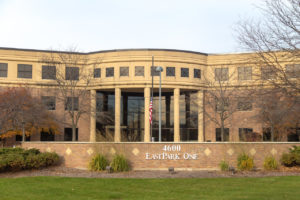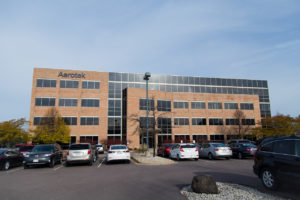Compass Properties Announces Promotions
Compass Properties is pleased to announce the promotion of Todd Greenwald to Vice President of Real Estate Operations and Kim Kindler to Corporate Controller.
“Todd and Kim have made major contributions to the growth of Compass Properties and each are excellent representatives of our principled approach to doing business,” said Tyler Noel, Compass Properties President. “In their new roles, both will continue to be an important part of our sustainable growth and long-term future.”
Greenwald is actively involved with the Madison Chapter of the International Facility Management Association (IFMA) and currently serves as its president. Prior to joining Compass Properties, Greenwald held property and operations management roles in commercial real estate. In Greenwald’s new and expanded role, he will oversee the company’s property management teams, manage day-to-day operations and continue to handle brokerage services for the Madison area and oversee leasing activities for our markets outside of Madison.
Kindler joined Compass Properties in 2012 and previously worked for its parent company Noel Group in the early 2000s. In her new role, she will oversee the company’s accounting and financial reporting, tax finance project management and payroll processes.
Vario Equity & Compass Properties Purchase Two Office Buildings in Madison’s American Center Business Park.
Wisconsin-based companies Vario Equity and Compass Properties recently completed their 1st joint venture with the purchase of two Class A office buildings located in Madison’s American Center Business Park. The 4600 American Parkway and 5133 West Terrace buildings were purchased from American Family Insurance for approximately $19 million, according to Compass Properties President Tyler Noel.
“This was a great opportunity to acquire two properties that provide Class A office space inventory in one of Madison’s premier office parks,” said Eric Heiting, Vario Equity’s managing director. “The Madison office market continues to be very strong, with some of the lowest vacancy rates in the Midwest. Current and future commercial real estate development on Madison’s far east side — including UW Health’s plans to build a $255 million clinic near the hospital it opened three years ago — will drive office space demand well into the future.”
Vario Equity is the lessor of the properties. Vario Equity was formed in 2018 with a vision to create an alternative investment portfolio of Wisconsin-based real estate assets for accredited investors. Compass Properties will provide property management and development services.
Noel said the properties were bought “off market” and a key part of the deal structure was the property management component. “American Family wanted to make sure its employees and other tenants in the two buildings would continue to get outstanding maintenance and other property management services,” he said. “They knew of our reputation for superior tenant service and our commitment to sustainability.”
The American Center Business Park is located on 447 acres near the intersection of Interstate Highway 90/94/39 and U.S. Highway 151. The park was developed with an eye toward protecting and preserving natural habitats and includes a mix of open space, ponds, wooded hills and more than three miles of biking and walking trails.
American Family Insurance recently completed an extensive capital improvement that updated the common areas of the buildings and upgraded many of the buildings’ amenities. Noel said that Compass Properties will implement sustainable building management practices that reduce waste, encourage healthy lifestyles, and conserve energy.
‘OPPORTUNITY ZONES’ KNOCK FOR STATE’S COMMERCIAL REAL ESTATE INVESTORS
Could opportunity zones be the next big thing in commercial real estate investing?
Tucked away in the federal tax cuts and job acts of 2017, the Opportunity Zone program is designed to drive long-term investment into designated, “economically distressed” areas across the country. However, due to the nature of the program, it appears that real estate interests are poised to benefit most from its potentially lucrative tax incentives.
To qualify for these tax incentives, you must reinvest existing capital gains in a qualified Opportunity Zone fund within 180 days of the realized exchange date of the gains. The Opportunity Zone program offers investors two benefits. First, investors can defer capital gains on a previous investment if the money is reinvested into an Opportunity Zone asset. Second, increasingly larger tax breaks are earned based on how long the investment is held. The first break comes at five years and the largest tax break comes when the asset has been held at least 10 years.
Investing in Wisconsin’s Opportunity Zones
Earlier this year, The U.S. Treasury Department approved 120 Opportunity zones in rural, urban and tribal areas of Wisconsin, with 48 of the zones in the southeastern portion of the state and 34 in the City of Milwaukee.
Two large-scale commercial development projects in West Allis are in Opportunity Zones and the developers plan to use the incentive to market their projects to investors, says John Stibal, the city’s development director. In a recent Milwaukee BizzTimes article, Stibal said the city of West Allis is “working with about a dozen projects that we expect to generate somewhere around $260 million in Opportunity Zone investments.”
Other southeastern Wisconsin communities with Opportunity Zones include West Milwaukee, South Milwaukee, Waukesha and Racine. In Milwaukee, the zones include areas on the far northwest side, including the former Northridge Mall and a neighborhood just west of Mitchell International Airport.
Madison and many other Wisconsin municipalities have set up websites with more information on Opportunity Zones in their area, along with qualifying opportunity fund investment opportunities. LaCrosse, for example, lists several opportunity zone projects seeking investors, including the Garden Terrace Project that consists of mixed-income housing and a community hub.
Wausau Economic Development Director Chris Schock says the program “opens doors for investors to be able to put money into public and private projects that otherwise might not be feasible from an investment perspective.”
Investing in qualified opportunity zone projects may not be ideal for the traditional real estate investor, according to Funrise CEO Bill Miller, who’s online investment platform was one of the first in the county to launch its own Opportunity Fund. Like others who have launched funds targeting Opportunity Zone investments in recent months, Miller noted that the vehicle is geared toward “upwardly mobile” and “fairly liquid” individual investors with a long-term view.



